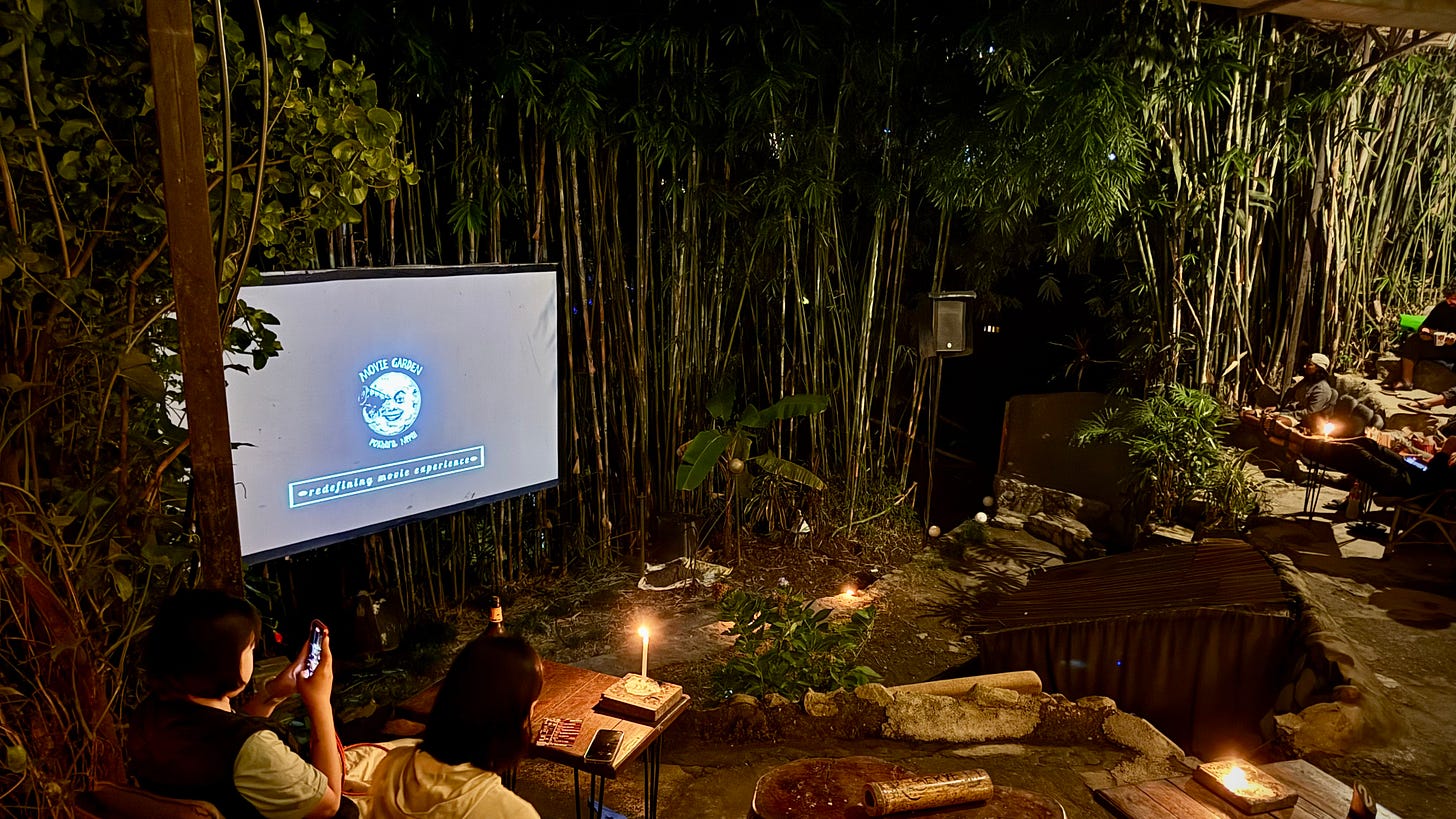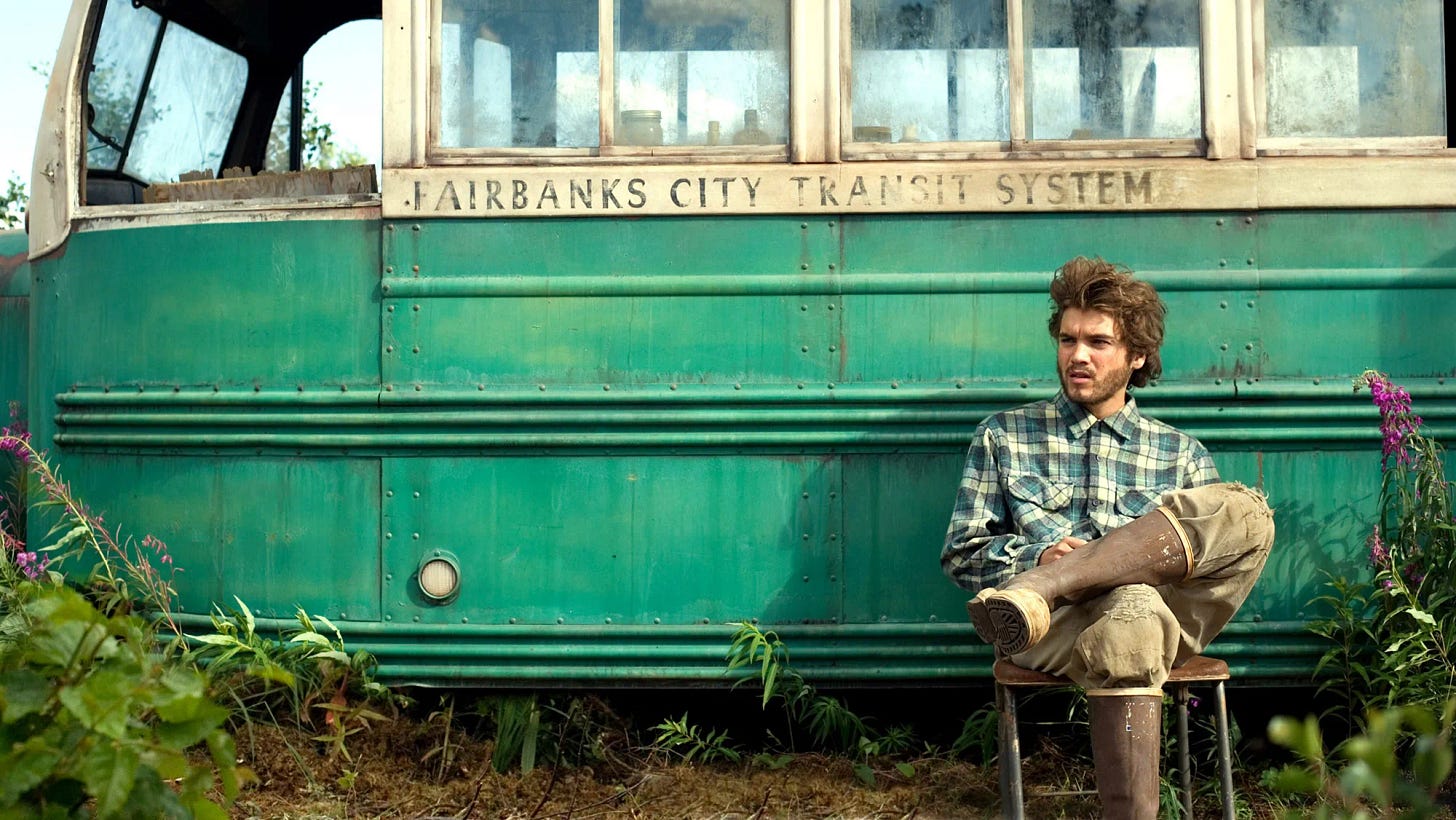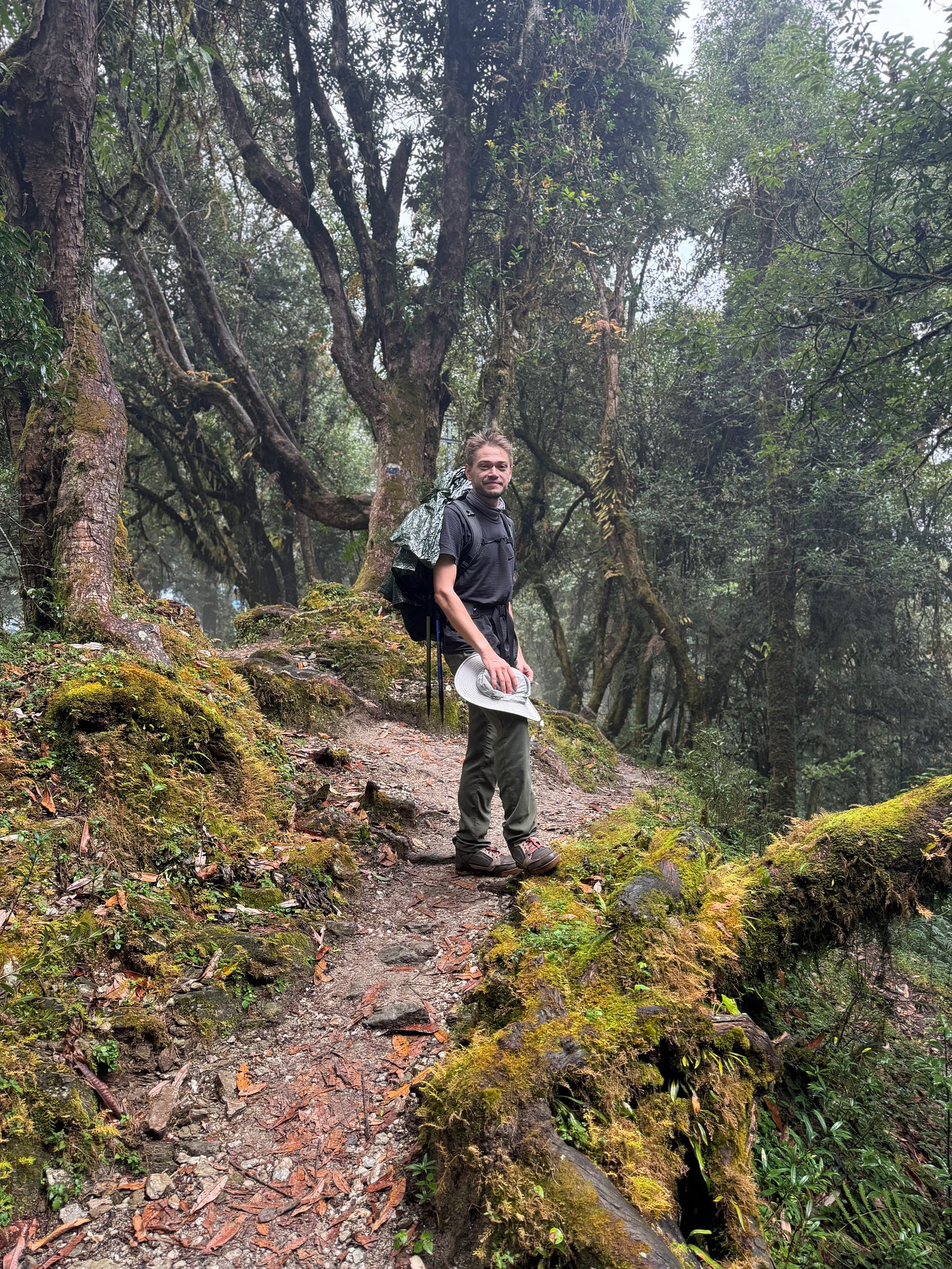I saw INTO THE WILD at an outdoor cinema in Nepal
Literally in the middle of “the wild” (a jungle)
The Lighthouse has been in development for many months across three continents. Today, finally, I’m kicking things off from Pokhara, Nepal!
Pokhara is about 200 kilometers - and one death-defying, 10-hour bus ride through a gauntlet of peaks and valleys - west of the capital, Kathmandu. It’s well known as a base for trekkers undertaking the Annapurna Circuit in The Himalayas.
But it’s also home to a unique moviegoing experience.
If you want to find Movie Garden Pokhara, you must veer off the main road and climb up into the jungle, leaving behind the rush of traffic and flashing lights of the lakeside area. The bustling sounds of tourism give way to the chatter of insects and birds.
An overgrown path winds past humble houses and store rooms, eventually feeding into an amphitheatre that reminded me very much of The Delacorte in NYC’s Central Park, where Shakespeare’s plays are staged against the backdrop of Manhattan.
Movie Garden is billed as Nepal’s first and favorite outdoor amphitheatre, and it’s easy to see why. The space feels enchanted, set back from civilization. Ashish, the guy who runs the place, exudes a passion for cinema that he and his team have transformed into a magical venue, where they can share their love of movies with an eclectic mix of travelers, volunteers, adventurers, and locals.
Considering the crowd (and Pokhara’s reputation as the gateway to a mountainous wilderness), Sean Penn’s Into the Wild was a strategic film for Ashish and his crew to screen the other night. I remember catching it in theatres back in 2007 and being moved in a way I couldn’t quite put words to, so I was keen to watch it again.
An adaptation of Jon Krakauer’s non-fiction book of the same name, Into the Wild tells the story of Christopher McCandless. Disillusioned by modern society, Christopher donates his law school fund to Oxfam, cuts up his credit cards and identification, and sets out on a cross-country journey into the wilderness. He wants to leave the rat race behind to embrace the purity and beauty of nature.
The story is told through a series of vignettes and flashbacks, chronicling Christoper’s adventures around America. He hitchhikes vast distances. Hops trains, works seasonal jobs for which he’s hugely over-qualified, and kayaks down to Mexico. He adopts the monicker “Alexander Supertramp” as a symbolic way of completing his break with society - and with his family, by whom he feels deceived and let down.
Strangers he meets along the way take him in and offer their love, but he moves on. Always, he moves on, chasing the siren’s call of Alaska… The ultimate frontier.
The handheld camerawork and elliptical editing (which was nominated for an Academy Award) together manifest the boundless sense of freedom that Supertramp feels. There’s a rawness to the style, a messiness that manifests his energy, enthusiasm, and zeal for living by his own uncompromising code. In his mind, Supertramp isn’t homeless. He’s simply chosen to live without a home, and he has no intention of returning to the contrivances of the paradigm he left behind.
There’s a certain appeal to Supertramp’s lifestyle - especially now, when the world seems to be tumbling into an abyss of amorality and authoritarianism; a tinderbox awaiting a match. It’s tempting to try and leave it all behind.
Heck, as a “nomad” myself at the moment, I’m living a (far) less extreme version of the lifestyle already, and I’d be lying if I said I wasn’t tempted by a “purer” version of the Walden-esque ideals Supertramp pursues... Like, I dunno, moving to New Zealand to raise Merino sheep in a far-flung cabin in the High Country somewhere.
But at what cost?
The film makes painfully clear how Supertramp’s sudden disappearance hurts his family and friends. Everyone sees - correctly, as it turns out - that his quest is blindly selfish and most likely doomed. [Spoiler alert] In fact, it’s a realization that Supertramp himself comes to by the end of the film.
Despite his lack of preparation, he does indeed make it to Alaska, which is everything he’d hoped for and more… Breathtaking wilderness governed by nature, not human contrivances, where he can live off the land on his own terms.
But it is a Pyrrhic victory.
Supertramp learns that the laws of nature are as uncompromising as he is. Facing the possibility of starvation, he tries to return to civilization, only to discover that the stream he crossed during the winter has become a raging river, cutting off his only route of escape. In desperation, he eats roots and plants - including, accidentally, a poisonous one. Supertramp dies slowly, painfully, trapped in the wilderness.
Alone.
Clinging to consciousness, he concludes: “Happiness [is] only real when shared”.
In his final moments, Supertramp reclaims the name of Christopher McCandless, imagining what life might have been like if he had managed to return to his family.
It is here that the brilliance of the film’s nonlinear story structure snaps sharply into focus. By contrasting Christopher’s seclusion in Alaska (the present) with the relationships he formed throughout his earlier travels (the flashbacks), the film forces us to realize what his idealism cost him… Human connection and, ultimately, his life.
Reflecting on all of this, there’s a part of me that thinks “Wow, and what a life it was!”
Consider the unbelievable things that Christopher saw and lived through that most people can’t even conceive of… “The core of man’s spirit comes from new experiences,” he lectures a wise older man at one point in the film. “You are wrong if you think that the joy of life comes principally from the joy of human relationships.”
But what did his “new experiences” ultimately amount to?
Toward the end of the film, Christopher reads a passage in one of his books that argues that the key to happiness involves “the possibility of being useful to people”.
How was he “useful”, and to whom?
Here, I think of a famous scene from Blade Runner, in my opinion one of the greatest scenes in cinema history. As his life ebbs away, Roy recalls all of the impossibly beautiful things he saw throughout his travels… Out there in the furthest reaches of space, beyond the fringes of civilization, on his own… And when he’s gone?
“All those moments will be lost in time, like tears in rain.”
Huddled in his sleeping bag, Christopher McCandless watches the sun peek through the clouds. He breathes his last. A tear rolls down his cheek, a smile touches his lips.
In Roy’s words: “Time to die”.
Movie Garden Pokhara was the perfect place for me to revisit Into the Wild, surrounded as I was by the sights and sounds of the jungle - a seductive frontier all its own. ⬅️ Like Werner Herzog in this clip, and perhaps like Christopher did Alaska, “I love it, I love it very much. But I love it against my better judgment.”
Have you seen the film? How well do you remember it, and what did you think? Did it impact you as much as it impacted me? I’d love to hear your thoughts!
If you’re navigating a creative pivot and want a focused 1:1 conversation, I offer free storytelling consults. We talk projects, direction, & how to shape your next chapter.














I was very much obsessed with this film upon its release -- as I'm sure many other young men were at the time. I didn't see it in theaters, however, but with a friend one afternoon at his house. We actually found ourselves more often repeating this quotation, which comes some time around his run-in with Catherine Keener's characters and life on the beach: "How important it is in life not necessarily to be strong… but to feel strong."
I always wondered what happened to Emilie Hirsch and why he stopped getting leading roles.
Also, the Eddie Vedder soundtrack is also a big part of what made the movie great, imo.